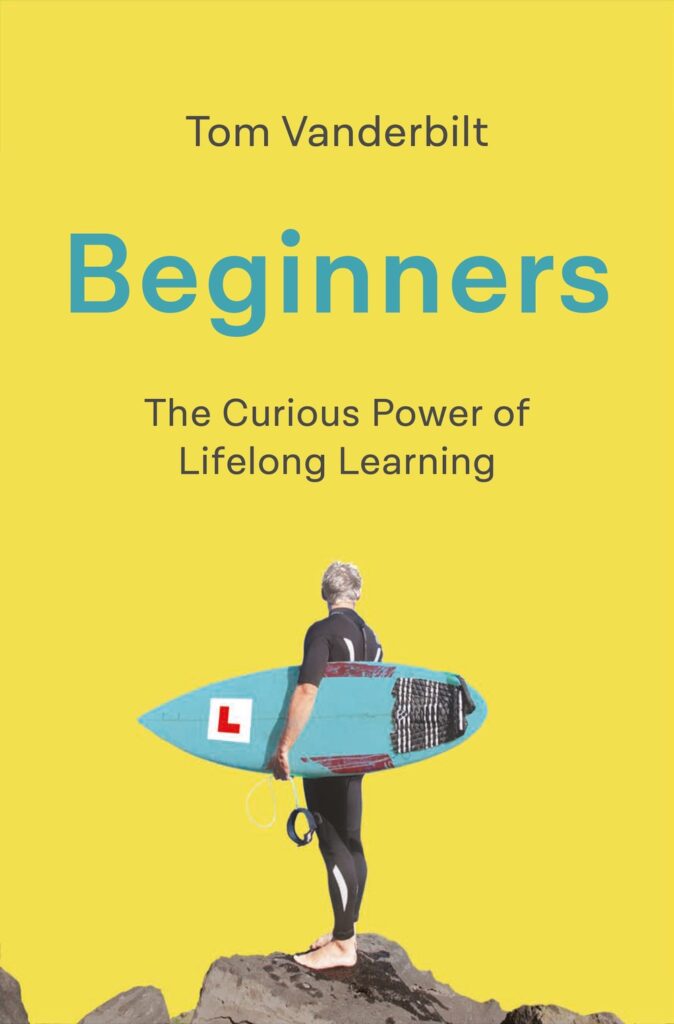Sharing my learnings from the book, Know Yourself, Beginners by Tom Vanderbilt
Beginners by Tom Vanderbilt
Inspired by his young daughter’s insatiable need to know how to do almost everything, and stymied by his own rut of mid-career competence, Tom Vanderbilt begins a year of learning purely for the sake of learning. He tackles five main skills (and picks up a few more along the way), choosing them for their difficulty to master and their distinct lack of career marketability–chess, singing, surfing, drawing, and juggling.
What he doesn’t expect is finding himself having rapturous experiences singing Spice Girls songs in an amateur choir, losing games of chess to eight-year-olds, and dodging scorpions at a surf camp in Costa Rica. Along the way, he interviews dozens of experts to explore the fascinating psychology and science behind the benefits of becoming an adult beginner. Weaving comprehensive research and surprising insight gained from his year of learning dangerously, Vanderbilt shows how anyone can begin again–and, more important, why they should take those first awkward steps. Ultimately, he shares how a refreshed sense of curiosity opened him up to a profound happiness and a deeper connection to the people around him–and how small acts of reinvention, at any age, can make life seem magical.

- Journalist Tom Vanderbilt made it a personal quest to reignite his long-lost love of always learning something new.
- Tom Vanderbilt had a steady career as a journalist. But when his daughter was born, he quickly discovered that he now had a second job. He became a teacher. As Vanderbilt found, when you’re a parent, you’re always teaching your children new skills. As Vanderbilt taught his daughter all these essential skills, he realized something about himself: he hadn’t learned a new skill in years. So, he decided to change that.
- Vanderbilt soon understood that being a beginner again came with lots of benefits.
- Singing is a skill that can be learned with practice.
- Humans produce sound by pushing air through our vocal folds, a series of stretchy muscles inside the throat. By tightening or loosening them, you make the air vibrate at different frequencies. And that changes our voice’s pitch. So, hitting the right notes and carrying a melody is merely a matter of coordinating your muscles and breathing correctly.
- most vocal lessons begin with exercises designed to help students reconsider their bodies. The aim is to look at the body as a musical instrument. This can involve making lots of strange, loose sounds like oohs and ahhs.
- Developing new skills works best as a social practice.
- practicing in a social setting comes with many advantages. For one, participating in a group activity taps into the innate human desire for social bonding.
- Practicing in front of others, or in a group, can also boost your performance. Humans learn best by observing others and getting feedback.
- The increase in ability that comes from working in a group is called social facilitation.
- Learning the basic rules is just the first step in a long journey.
- skill acquisition usually comes in five steps.
- novices
- advanced beginner
- competence
- proficiency
- expertise
- To master a skill, practice it until the movements become automatic.
- over-thinking can be a strong barrier to acquiring skills.
- the best way to learn is observing and doing. They are so much more beneficial than simply receiving instruction.
- As you practice a new skill, or even just intently watch someone else do it, you build new neurological connections. You develop something that’s often called muscle memory. But really, it’s your brain that’s doing the heavy lifting.
- Learning to draw is all about learning how to see the world with fresh eyes.
- we draw the world as we imagine it, not how it actually appears.
- effective drawing lessons focus on making students draw what they actually observe. Instead of drawing whole things, students practice by rendering shapes and shadows.
- It’s never too late to try something new.
- As we age, it’s important to remain a beginner at something.
- if you’re feeling in a rut, remember that there’s always something new to learn. Discover what opportunities exist near you.
- “It takes a whole life to learn how to live.”


Leave a Reply